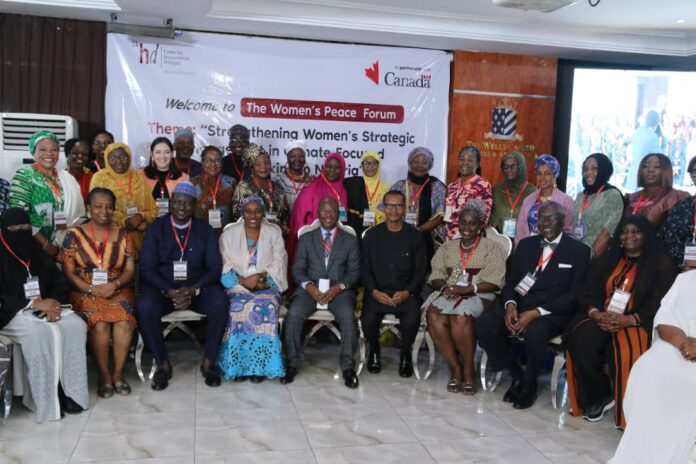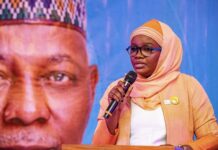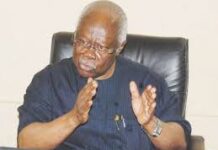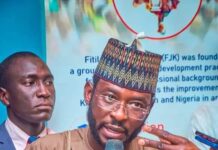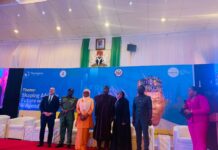How Climate Change Is Threatening Communal Life, Affecting Women – HD Boss
By Nafisat Bello
The Country Manager of the Centre for Humanitarian Dialogue (HD), Chris Agoha, has said women are at the receiving end of the devastating effects of climate change across the developing world.
Agoha spoke in an opening address at a three-day workshop on the strategic roles for women in climate-focused peacemaking in Nigeria organised by the group in partnership with the Government of Canada.
This year’s event is the second edition and it came with the theme: “Strengthening women’s strategic engagement in climate-focused peacemaking in Nigeria.”
“The trends of climate change is directly or indirectly affecting the nature, severity, and duration of inter-state and intra-state tension and conflicts over natural resources in many of Nigeria regions.
“There has been growing evidence, showing the effects of climate change, such as severe droughts, floods, and sea-level rise are significantly impacting communities and their livelihoods. Moreover, human activities such as land use further complicate our understanding of climate change.
“Many developing countries are especially vulnerable to climate effects because of poverty, conflicts, lack of gender and social equality, environmental degradation and lack of food.In October 2015, diplomats, policy-makers, activists and observers gathered in New York to mark 15 years since the passage of United Nations Security Council Resolution 1325, generally accepted as the founding document of the Women, Peace and Security (WPS) agenda (although women’s activism for peace predates UNSCR 1325 by many decades).
“Its passage was described on that occasion as ‘one of the most inspired decisions’ of the Council, a commitment to women’s participation which remains ‘at the top’ of the UN agenda, and as integral to ‘faithfully advancing international peace and security’ The passing Resolution 1325 on “Women, Peace and Security” solidified the understanding that women bring a much- needed presence to the resolution of violent conflicts with full participation in the peace process,” he said.
He continued: “At the forefront of the dialogue and mediation work of the Centre for Humanitarian Dialogue, is the commitment to strongly promote the understanding that women are vital to the resolution of conflict, and to consistently call for increased participation of women in peace processes because of the positive effect they have assumed.
Read Also:
“A more robust measure of women’s representation in peacemaking is needed before we can claim that their representation results in gendered outcomes that marginalize their interests and concerns. It is therefore important to recognize and demand for three levels of women’s representation: (1) physical presence, (2) representation in taking the floor, and (3) participation in argumentation, that is, in the debate that will ultimately culminate in decisions on policies that affects their lives.
“At HD will believe that the evidence is overwhelming: where women’s inclusion is prioritized, peace is more likely, particularly when women influence decisions about war and peace and take the lead against extremism in their communities, it is more likely crises will be resolved without recourse to violence.”
“A Report of 2015, titled “WHY WOMEN? Inclusive Security and Peaceful Societies”noted that, where women are more empowered, countries are less likely to go to war with their neighbors or to be rife with crime and violence within their society.
“A Rand Corporation Studies, stated that “when women serve in police forces, which research shows are more effective at combating terrorism, this can be a particularly valuable skill, as they bring a complementary understanding of the threat environment in the communities they serve.
“When women are in a position to influence decision-making, they bridge divides and build coalitions for peace. They bring different perspectives to bear on what peace and security mean and how they can be realized, contributing to a more holistic understanding of peace that addresses long-term needs as well as short-term security.
“This project is part of HD’s pivotal work in making women agents of change in peacemaking and conflict resolution in Nigeria. We strongly believe that women’s voices should not only be heard in peacemaking, but their strategic engagements should envision taking part in making decisions that would respond to the various needs of their beleaguered communities.”
In her goodwill message, the Women Country Representative to Nigeria and ECOWAS, Beatrice Eyongun, said: “Nigeria’s 2nd generation National Action Plan (NAP) 2017-2020 elapsed in 2020.
“The Government of Nigeria, through the Federal Ministry of Women Affairs is in the process of developing the 3rd NAP through a multi-sectoral approach. The current peace and security challenges in Nigeria, including climate change vis-a-vis the farmer-herder crisis, cybercrime, kidnapping for ransom, armed robbery and incessant attacks by the insurgents, among others have devastating effect, particularly on women and girls and other vulnerable groups.”

